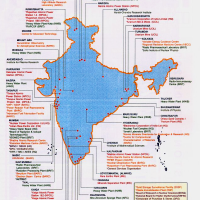Theme 2012:
New Voices: Media Freedom Helping to Transform Societies
World Press Freedom Day was proclaimed by the UN General Assembly in December 1993, following the recommendation of UNESCO’s General Conference. Since then, 3 May, the anniversary of the Declaration of Windhoekis celebrated worldwide as World Press Freedom Day. It is an opportunity to:
- celebrate the fundamental principles of press freedom;
- assess the state of press freedom throughout the world;
- defend the media from attacks on their independence;
- pay tribute to journalists who have lost their lives in the line of duty.
The recent uprisings in some Arab States have highlighted the power of the media, the human quest for freedom of expression and the confluence of press freedom and freedom of expression through various traditional and new media.
This has given rise to an unprecedented level of media freedom. New media have enabled civil society, young people and communities to bring about massive social and political transformations by self-organizing, and engaging the global youth in the fight to be able to freely express themselves and the aspirations of their wider communities.
Yet, media freedom is fragile, and it is also not yet within the reach of everyone. Furthermore, as more reporting is transmitted online, more and more online journalists including bloggers are being harnessed, attacked and even killed for their work.
SAFMA, SAMC appeal for safeguarding media freedom
In a joint statement issued ahead of the World Press Freedom Day which falls on May 3, the South Asian Free Media Association (SAFMA) and the South Asia Media Commission (SAMC) have urged governments in South Asia to safeguard the freedom of expression against repressive provisions, measures or groups.
The two media bodies termed the commemoration of this year’s Press Freedom Day, with its theme as “New Voices: Media Freedom Helping to Transform Societies,” an opportunity to celebrate the fundamental principles of media freedom. It would also serve as an occasion to evaluate media freedom, to defend the media from attacks on their independence, and to pay tribute to journalists who have lost their lives in the line of duty.
“Freedom of expression is a precious right that bolsters every other freedom and provides a foundation for human dignity. Free, pluralistic and independent media is essential for exercising this right,” said SAFMA secretary-general Imtiaz Alam and SAMC president Kumar Ketkar.
The SAFMA and the SAMC called on the governments in the region to commit themselves to supporting and expanding press freedom and the free flow of information in the digital age. “New media have enabled people to bring about massive social and political transformations. Yet, media freedom is fragile, and it is also not yet within the reach of everyone. Furthermore, as more reporting is transmitted online, more and more online journalists including bloggers are being attacked and even killed for their work,” Mr. Alam and Mr. Ketkar said.
According to statistics with the two media bodies, 185 journalists have been killed since 1992 for their work. Of these, Pakistan tops the tally with 58 followed by India 39, Afghanistan 28, Sri Lanka 25, Bangladesh 18, and Nepal 17.
A free press is a form of freedom of expression, providing citizens with access to knowledge and information, thus safeguarding any political system based on the will of the people.

Photo: Reuters
Members of the media tape their mouth as they protest against the arrest of journalists in Panama. (file)
A free press is a form of freedom of expression, providing citizens with access to knowledge and information, thus safeguarding any political system based on the will of the people. On May 3rd, we celebrate World Press Freedom Day. It is a day to consider the importance of freedom of the press, and to remind governments of their duty to respect and uphold the right to freedom of expression as stipulated in Article 19 of the Universal Declaration of Human Rights.
But Freedom of the Press Day serves not only to highlight the importance of an uncensored press: it also serves as a reminder that in dozens of countries around the world, publications are censored, fined, suspended and closed down; that in many countries, journalists, editors and publishers and bloggers are harassed, attacked, jailed and even murdered. It aims to remind governments of the need to respect their commitment to Press Freedom, and to journalists
This day also serves as a reminder to professionals of their responsibility to society, and of the importance of maintaining professional ethics. It is a day of support for media which are targets for the censorship, or abolition of press freedom. And it is also a day of remembrance for those journalists who lost their lives in the exercise of their profession.
Former Philippine President Corazon Aquino once said that “Freedom of the press guarantees popular participation in the decisions and actions of government, and popular participation is the essence of democracy.”
A free press is sometimes called the Fourth Pillar of Democracy. That is because a free press reports abuses of power by public officials. It shines a spotlight on government decision makers and those who influence them. It keeps the citizens informed of news critical of the government, gives them the opportunity to exchange information and opinions about public affairs without interference by government officials. It spurs them into pressuring the government to right wrongs.
As one-time U.S. Supreme Court Judge Felix Frankfurter once said, “Freedom of the press is not an end in itself but a means to the end of [achieving] a free society.”
A silent press means the end of democracy.
Call for code of ethics for citizen journalism
The theme for this year’s World Press Freedom day is “New Voices: Media Freedom Helping to Transform Societies”.
In the open letter, Smith and Achtelstetter draw attention to the transformative power of new media technologies and social media. They cite the ongoing uprisings in the Middle-East which highlight “the potential of citizen journalism to counter attacks on freedom of expression and freedom of the press.”
However, they caution that while emerging media technologies and social media platforms offer new channels for increased information flows and strengthening communication rights, using them demands greater responsibility. “Part of that responsibility is developing and adapting professional standards to guide journalistic practice,” they say.
WACC believes that freedom of expression and freedom of the press are basic human rights. Media independence and pluralism strengthen democratic processes and promote both government accountability and citizen participation. WACC’s new Strategic Plan 2012-2016 focuses especially on the role communication rights play in giving voice to poor, marginalized, excluded and dispossessed people and communities.
Read full letter here
‘Censorship on Journalists a Threat to Democracy’
|
|
|
| New Delhi, May 2 (IANS): Violence and censorship against mediapersons are a “threat” to democracy and also constrains their ability to operate freely, an international body of journalists said Wednesday.The Commonwealth Journalists Association (CJA) also condemned state repression against media in countries like Pakistan and Sri Lanka.
“Without a free press and freedom of expression, governments can impose bad policy and abuse power with impunity,” said Rita Payne, president of CJA, underlining the consensus at a meet on ‘Threats to Democracy’.
Violence and censorship remains an everyday threat for many journalists and such constraints their ability to operate, the CJA said in a statement to mark World Press Freedom Day May 3.
“The CJA unanimously condemns instances of state repression against media reported out of Pakistan, Sri Lanka and some African member states of the Commonwealth,” Payne said.
“With some Commonwealth countries, including India and Pakistan resisting a draft UN Action Plan on safety of journalists, the CJA warned that democracy itself is under threat due to constraints on the ability of journalists to operate,” she added.
Putting action to words, the CJA has endorsed the Table Mountain Declaration, aimed at abolishing criminal defamation and promoting a free press in Africa.
In 2011, 179 journalists were imprisoned worldwide, up from 145 the previous year while another 67 were killed last year; 17 more so far this year. They were murdered, killed on dangerous assignments or died in crossfire, Payne said.
Pakistan is rated among the most dangerous countries in the world for journalists. South Africa has enacted strict censorship measures that limit reporting on corruption and attempt to control the press.
The CJA’s efforts are global, with its branches in Pakistan, Sarawak, Uganda, Cameroon, India and Britain among those holding educational workshops and awareness-raising events to mark World Press Freedom Day.
“It is time for all Commonwealth countries to uphold the same values of a civil society. The onus here is on governments. Press freedom and freedom of speech must be protected and promoted,” Payne said. |


















